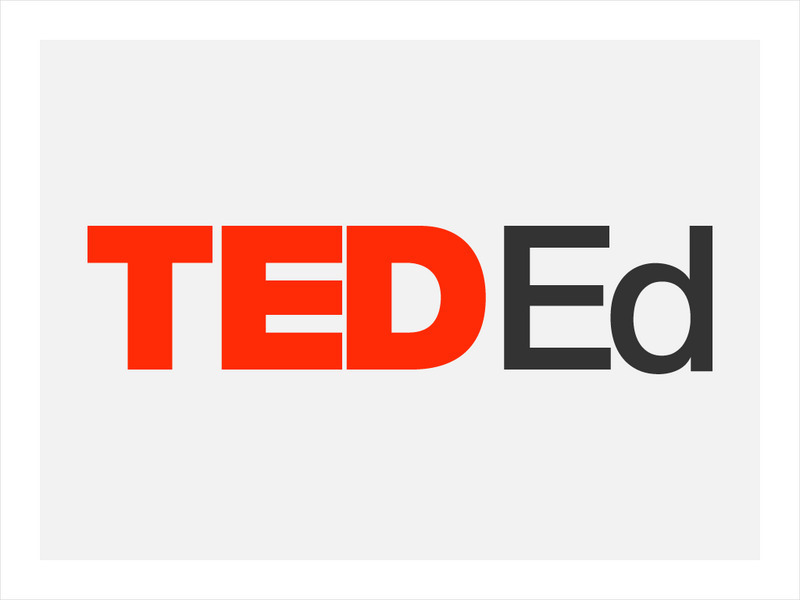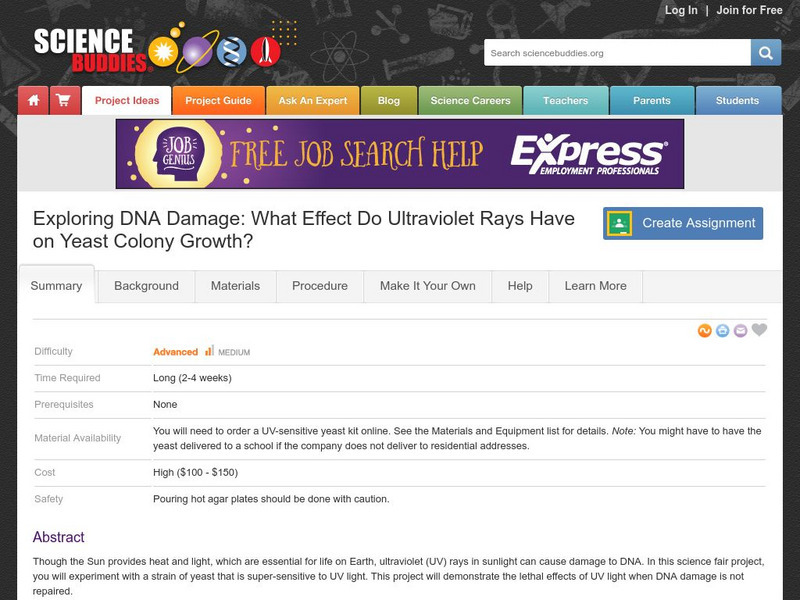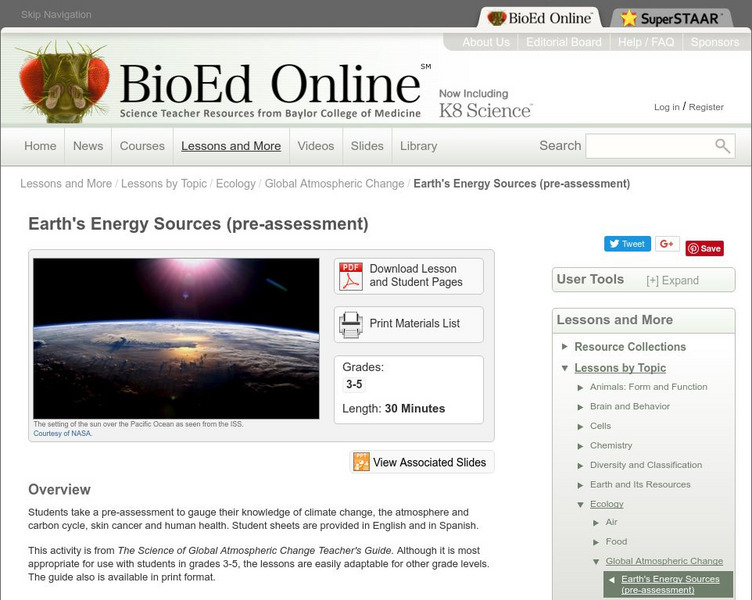Hi, what do you want to do?
Cornell University
Shedding a "Little" Light on Cancer Surgery
Many types of cancer treatments now depend on nanotechnology—a big "little" discovery. Scholars begin by removing "malignant" tissue from simulated brains, one using fluorescent markers thanks to nanotechnology and one without. This...
Nemours KidsHealth
Skin Cancer: Grades 9-12
Lather up! That's the takeaway from two activities that focus on skin cancer. To begin, class members read articles to gather information about sun exposure, tanning, and skin cancer. They use this information to design a pamphlet to...
Southern Kennebec Child Development Corporation
Sun Blocks: Building a Foundation for Healthy Skin
Here comes the sun! Primary graders engage in activities that teach them how to protect themselves from the effects of UV rays. They learn that each season (fall, winter, spring, and summer) offers its own special challenges so they...
Teach Engineering
Nanotechnology Grant Proposal Writing
Please, sir, can I have a few thousand dollars for my research? The last installment in a six-part lesson has the pupils develop a grant proposal. Class members apply their knowledge of skin cancer, ultraviolet radiation, human skin, and...
Teach Engineering
Skin and the Effects of Ultraviolet Radiation
Though UV radiation can damage skin, it isn't all bad. The third installment in a six-part series allows the class to study the structure and function of skin. They learn about the different types of skin cancer and the SPF rating...
Teach Engineering
Electromagnetic Radiation
How can nanoparticles be used in the battle against skin cancer. Class members take on the question as they gather information about electromagnetic radiation, specifically ultraviolet radiation. Pupils learn about the mathematical...
Nemours KidsHealth
Skin Cancer: Grades 6-8
Do we really need sunscreen? What are the risks of tanning? Learners explore these questions through a series of informational texts and engaging, hands-on activities.
Curated OER
Skin Cancer Lesson Plan
Skin care is a topic often overlooked in the health curriculum. This should not be the case because most types of skin cancer can be prevented, or if detected early enough, can be successfully treated. So take the time to teach your...
Curated OER
Skin Cancer Investigation: A Multi-Component Project
Students compare the perceived and actual risks of getting skin cancer, while looking at ways to minimize these risks. They may have very little grasp of the severity of the threat of skin cancer or be unaware of the increase in the...
Curated OER
UV Rays, sunscreen effectiveness
Students identify and define that invisible UV rays can be harmful. Then they explore the effects of UV radiation on objects that react UV rays and what products are most effective in blocking UV rays. Students also make predictions...
Curated OER
UV: Use Caution
Young scholars investigate the concept of skin cancer and its relation to using tanning beds that expose people to artificial ultraviolet rays. They research the effects and look for ways to prevent the onset of skin cancer from the...
Curated OER
Skin Cancer Prevention
Students discuss skin cancer prevention. In this skin cancer lesson, students read a pamphlet that tells the causes of skin cancer and what you can do to prevent it. Students will choose from a variety of projects which focus on skin...
Curated OER
UV Rays
Fourth graders study the effects of UV rays and practice finding the UV index for where they live. In this health instructional activity, 4th graders listen to a lecture about ultraviolet rays, then find the UV index in their area and...
Nemours KidsHealth
Quiz: Skin Cancer (Grades 6 to 8)
In this skin cancer worksheet, students review the harmful rays from the sun that cause sunburn and explain the link between the sun and skin cancer. This worksheet has one true-or-false, three multiple-choice, three fill-in-the-blank,...
Curated OER
Skin Cancer Prevention
In this health learning exercise, middle schoolers find the words related to the concept of skin cancer and the answers are found by clicking the button found at the bottom of the page.
Curated OER
LEARN NOT TO BURN!
Students observe the effect of different filter thickness on ultraviolet radiation and discover that ultraviolet radiation is necessary for the production and destruction of ozone.
American Cancer Society
American Cancer Society: Melanoma Skin Cancer
The American Cancer Society provides a wealth of information about melanoma skin cancer. Content includes a general overview, a detailed guide, and links to other sources of information. An excellent starting point to learn about this...
TED Talks
Ted: Ted Ed: Why Do We Have to Wear Sunscreen?
You already know that a trip to the beach can give you a nasty sunburn, but the nitty gritty of sun safety is actually much more complex. Wrinkle-causing UVA rays and burn-inducing UVB's can pose a serious risk to your health (and good...
Science Buddies
Science Buddies: Project Ideas: Dna Damage: Ultraviolet Rays and Yeast Colonies
In this biotechnology science fair project, investigate how DNA damage affects growth of yeast that are DNA-repair deficient. The Science Buddies project ideas are set up consistently beginning with an abstract, objective, and...
Science Buddies
Science Buddies: Project Ideas: Don't Get Burned: Uv Index Throughout the Day
Sun tanning has a bad rap right now. Use a personal ultraviolet monitor to measure the UV index to prevent getting a sunburn. With this science fair project you will create a chart showing the UV ray measurement at different times of the...
The Association of the British Pharmaceutical Industry
Abpi: Skin Structure and Function
An interactive, self-paced lesson on the body's largest organ, the skin. Students learn information and watch descriptive animations to aid in understanding, answering review questions throughout the activity. A self-check quiz follows...
BioEd Online
Bio Ed Online: Earth's Energy Sources (Pre Assessment)
A pre-assessment at the beginning of a unit on global atmospheric change. It checks understanding of issues around climate change and the impact it has on the environment and on human health. The lesson and accompanying slideshow can...
Other
Back From the Brink: Lessons Learned From Saving the Ozone Layer [Pdf]
Good site for material on the people involved in inventing CFCs and those who discovered its effects on the ozone layer.
National Institutes of Health
Nih Curriculum Supplement for Middle School: Looking Good, Feeling Good
A great resource from the Office of Science Education which provides a curriculum for teaching about the musculoskeletal system, the skin system and how they interact. This curriculum emphasizes choices teens can make to ensure good...


























